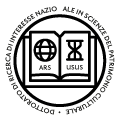The educational branch of the PhD Program of National Interest in Cultural Heritage encompasses, in addition to conducting scientific research and dissertations writing, several educational and scientific activities, as approved by the professors on a case by case basis, including: participation in conferences and seminars outside the PhD Program both as speaker or attendee; tutoring students enrolled in undergraduate and master’s degree courses; undertaking teaching or other forms of knowledge dissemination related to the individual PhD student’s PhD project; conducting advanced training activities in laboratories or research institutes and infrastructures; interdisciplinary training activities language proficiency enhancement; computer training; improvement in research management and knowledge of European and International research systems, dissemination of the research results, understanding of what constitutes intellectual property, and open access to research data and products, fundamental principles of ethics, gender equality, and integrity, as well as further research experiences in Italy and abroad.
The curriculum in which each doctoral student is enrolled encompasses in-person teaching and related individual study with lectures, seminars, and hands-on instruction; only the successful passing of a comprehensive final examination permits the student to obtain the doctoral degree.
The training and educational activities shall be recorded annually by the doctoral students in their dossier/transcripts, which must be validated either by their respective tutors or by other designated members of the PhD Program Committee.
The enrolment renewal (from the first to the second and from the second to the third year) for each doctoral student is subject to a positive assessment following the presentation of their research progress, during seminar meetings scheduled annually within each curriculum. These meetings take place in the presence of the doctoral students of all the cycles of the curriculum and their professors and tutors.
Thanks to the travel funds for PhD candidates, each doctoral student is required to spend a research period abroad, to carry out research in archives, libraries, and/or other institutions as well as to attend conferences and seminars related to their PhD thesis research.
Each curriculum organizes and manages its own educational programs autonomously, as indicated on their respective website pages. Inter-curricular activities apply to all the curricula involved.
Further educational and research opportunities
- Language skills: Doctoral students who have at least an elementary level of language proficiency are required to take specific language enhancement courses (with particular reference to English language); they also have the opportunity to take courses offered by the Centro Linguistico di Ateneo (the University Language Center).
- Computer skills: Doctoral students can make use of the university’s laboratories and the operational and scientific facilities of the research institutes that collaborate with the PhD. Program.
- Research management: in the training, specific aspects related not only to the planning of research (access to sources and their archiving and contextualization) are included, but also regarding field investigations and their practical aspects (logistics, organization, etc.). The Doctorate also relies on the collaboration of the personnel responsible for the financial management of research projects within the Department for training on research funding
- Research planning: the PhD educational program includes specific aspects relating not only to the research planning (access to historical and archival sources and their contextualization), but also to field investigations and related practical aspects (logistics, organization, etc.). The PhD Program also relies on the collaboration of the Department’s staff in charge of the financial management of research projects, for training in obtaining and managing research funding.
- Dissemination of research results: since the Doctoral Program relies on solid partnerships with universities and research institutes (National and International) of recognized standing, the acknowledgement of doctoral students’ research results passes, first and foremost, through their participation in seminars and conferences (with papers and/or poster sessions).
- For those students performing at the top level of academic achievement, each curriculum promotes also the publication of articles in respected scholarly journals specialized for different academic disciplines, with particular reference to those being rated as “Class A” journals by the ANVUR (the Italian National Agency for the Evaluation of Universities and Research Institutes) or indexed in Scopus and/or WoS-Clarivate.
- Interdisciplinary teaching: the agreements that the PhD Program has established with research organizations and companies allow doctoral students to benefit from particularly original teaching opportunities not always associated with the academic field of humanities. As a result, it is possible for the students to enrich his or her regular curriculum by attending scholarly seminars outside the normal curriculum.

